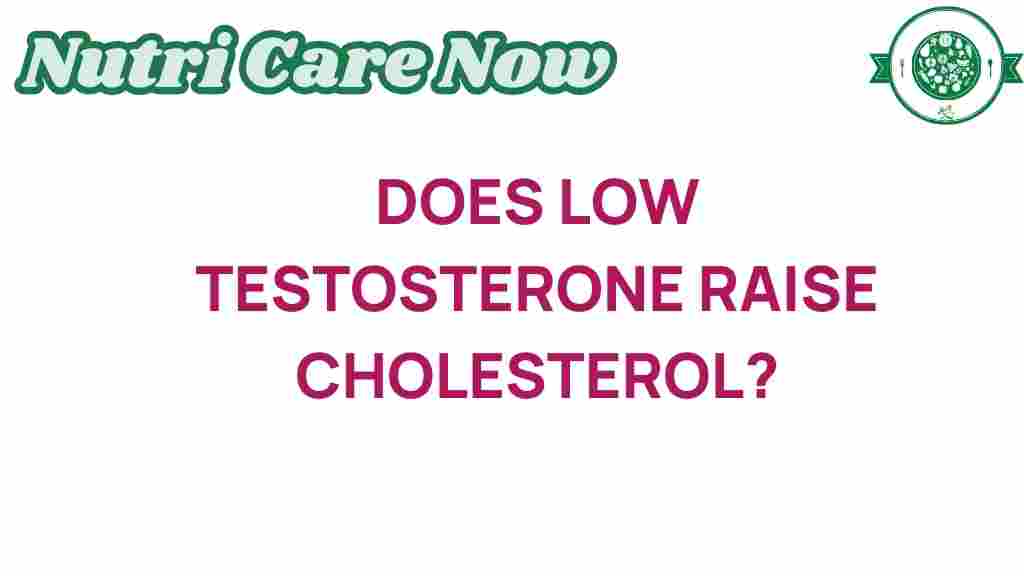Unraveling the Connection: Does Low Testosterone Raise Cholesterol?
Testosterone is often associated with strength, vitality, and overall well-being, particularly in men. However, its role goes beyond just physical attributes. The relationship between testosterone and cholesterol levels has gained attention in recent years, raising critical questions about men’s health and cardiovascular risk. This article explores the connection between testosterone, cholesterol, and health, delving into how hormone levels can impact the endocrine system and overall wellness.
Understanding Testosterone and Cholesterol
Testosterone is a vital hormone that plays a significant role in various bodily functions, including:
- Regulating bone density
- Maintaining muscle mass
- Influencing mood and energy levels
- Impacting sexual health
Cholesterol, on the other hand, is a type of fat found in your blood that is essential for building cells and producing hormones. However, imbalanced cholesterol levels can lead to cardiovascular diseases. Understanding how these two elements interact is crucial for men’s health.
The Link Between Testosterone and Cholesterol Levels
Recent studies suggest a complex relationship between testosterone and cholesterol. Low testosterone levels may lead to an increase in cholesterol levels, potentially elevating cardiovascular risk. Here’s how:
- Hormonal Imbalance: Testosterone helps regulate cholesterol metabolism. Lower testosterone may disrupt this balance, leading to higher levels of LDL (low-density lipoprotein) cholesterol.
- Increased Body Fat: Low testosterone can contribute to weight gain and increased body fat, factors known to raise cholesterol levels.
- Endocrine System Influence: The endocrine system is responsible for hormone regulation, including testosterone. An imbalance in this system can affect cholesterol levels.
How Low Testosterone Affects Men’s Health
Men with low testosterone may experience a range of health issues, including:
- Reduced libido and sexual dysfunction
- Fatigue and decreased energy levels
- Loss of muscle mass and strength
- Increased risk of obesity and metabolic syndrome
These factors can contribute to elevated cholesterol levels, creating a cycle that negatively impacts overall health and wellness.
Assessing Your Hormone Levels
To understand if low testosterone is affecting your cholesterol levels, it’s essential to assess your hormone levels. Here’s a step-by-step guide:
- Consult a Healthcare Provider: Schedule an appointment with your doctor to discuss your symptoms and concerns.
- Blood Tests: Your doctor may order blood tests to measure your testosterone and cholesterol levels. This will help identify any hormonal imbalances.
- Review Medical History: Discuss any medical conditions that may affect hormone levels or cholesterol.
- Physical Examination: A thorough physical examination can provide additional insights into your health status.
Improving Hormone Levels and Cholesterol Through Lifestyle Changes
Making lifestyle changes can significantly impact hormone levels and cholesterol. Here are some effective strategies:
- Regular Exercise: Engaging in regular physical activity helps boost testosterone levels and improve cholesterol profiles. Aim for a mix of cardio and strength training.
- Healthy Diet: Incorporate foods rich in healthy fats, such as avocados, nuts, and olive oil, while reducing processed foods and sugars. A Mediterranean diet is often recommended for heart health.
- Weight Management: Maintaining a healthy weight can help regulate hormone levels and improve cholesterol levels.
- Stress Reduction: Chronic stress can lower testosterone levels. Practice stress management techniques such as meditation, yoga, or deep breathing exercises.
- Sleep Hygiene: Prioritize quality sleep, as inadequate sleep can negatively impact hormone levels.
Troubleshooting Tips for Low Testosterone and High Cholesterol
If you suspect that low testosterone is affecting your cholesterol levels, consider the following troubleshooting tips:
- Monitor Symptoms: Keep track of any symptoms you experience related to low testosterone, such as fatigue, mood changes, or sexual dysfunction.
- Schedule Regular Check-ups: Regular visits to your healthcare provider can help monitor your hormone levels and cholesterol over time.
- Consider Professional Guidance: If lifestyle changes are not yielding results, consult with a healthcare professional or a nutritionist for personalized advice.
- Explore Medical Options: In some cases, testosterone replacement therapy may be recommended. Discuss the benefits and risks with your healthcare provider.
Conclusion: Prioritizing Men’s Health and Wellness
The connection between low testosterone and cholesterol is significant, impacting men’s health and overall wellness. Understanding this relationship can empower men to take proactive steps to improve their hormone levels and cardiovascular health. Regular check-ups, lifestyle changes, and open discussions with healthcare providers are essential for managing testosterone and cholesterol effectively.
By prioritizing health and wellness, men can reduce their cardiovascular risk and lead healthier, more fulfilling lives. If you want to learn more about maintaining hormone balance and improving overall health, check out this informative resource on hormonal health and wellness strategies.
Remember, your health is your wealth. Taking charge of your testosterone and cholesterol levels is a crucial step towards a healthier future.
This article is in the category Health and created by NutriCareNow Team
